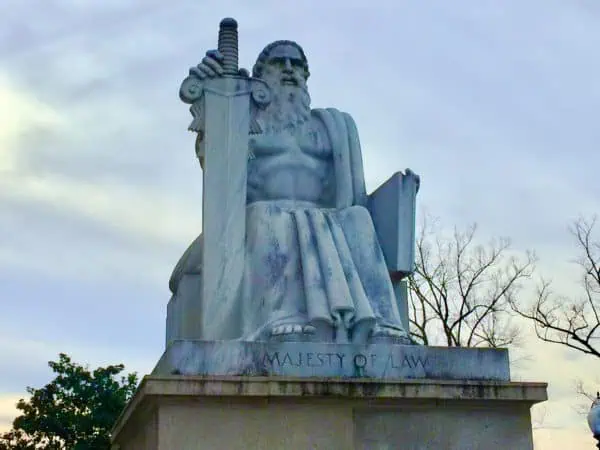On Monday, the US Department of Justice announced it had received a guilty plea from the “first-ever cryptocurrency insider trading case.”
Originally covered this past July, the Securities and Exchange Commission (SEC) simultaneously filed insider trading charges along with the U.S. Attorney’s Office for the Southern District of New York against a former Coinbase (NASDAQ:COIN) manager Ishan Wahi, his brother Nikhil Wahi, and his friend, Sameer Ramani. Nikhil Wahi has now pleaded guilty to one count of conspiracy to commit wire fraud in regards to insider trading in crypto assets by using confidential Coinbase information about which crypto assets were scheduled to be listed on Coinbase’s exchanges. The wire fraud charge carries a maximum sentence of 20 years in prison but the guilty plea probably means a sentence far more lenient than the max. Wahi is scheduled to be sentenced on December 13, 2022. No word on the co-defendants.
U.S. Attorney Damian Williams issued a comment stating the defendant has admitted guilt and the plea should serve as a reminder to those that are active in crypto markets that they will “continue to steadfastly police frauds of all stripes and will adapt as technology evolves.”
“Nikhil Wahi now awaits sentencing for his crime and must also forfeit his illicit profits,” said Williams.
The charges as filed, claim that beginning around October 2020, Ishan Wahi worked at Coinbase as a product manager assigned to a Coinbase asset listing team. Wahi was apparently closely involved in the confidential process of listing crypto assets on Coinbase’s exchanges. In his role, he had advanced knowledge of which crypto assets Coinbase was planning to list and the timing of public announcements about those crypto asset listings. With this information in hand, the defendants were able to trade on the confidential information and thus generate illicit profits.
Coinbase was quick to condemn the activity by its former manager, reporting that it had worked closely with enforcement officials to uncover the activity. At the same time, Coinbase took umbrage at the fact the SEC alleged insider trading of securities, thus challenging Coinbase’s assertion it does not list securities setting up a legal battle.
Paul Grewal, Coinbase Chief Legal Officer, stated at that time:
“We cooperated with the SEC’s investigation into the wrongdoing charged by the DOJ today. But instead of having a dialogue with us about the seven assets on our platform, the SEC jumped directly to litigation. The SEC’s charges put a spotlight on an important problem: the US doesn’t have a clear or workable regulatory framework for digital asset securities. And instead of crafting tailored rules in an inclusive and transparent way, the SEC is relying on these types of one-off enforcement actions to try to bring all digital assets into its jurisdiction, even those assets that are not securities.”
Coinbase has long asserted that its platform does not list securities and incorporates a “rigorous review” to determine which crypto assets are securities – and which are not.
CFTC Commissioner Caroline D. Pham, came to the defense of Coinbase, slamming regulators for pursuing regulation by enforcement instead of creating bespoke rules for digital assets.
Pham stated:
“The SEC complaint alleges that dozens of digital assets, including those that could be described as utility tokens and/or certain tokens relating to decentralized autonomous organizations (DAOs), are securities. The SEC’s allegations could have broad implications beyond this single case, underscoring how critical and urgent it is that regulators work together. Major questions are best addressed through a transparent process that engages the public to develop appropriate policy with expert input—through notice-and-comment rulemaking pursuant to the Administrative Procedure Act. Regulatory clarity comes from being out in the open, not in the dark.”
 CI reached out to Philip Moustakis for some perspective. Moustakis previously worked at the SEC and is now Counsel in the Government Enforcement & Internal Investigations and Blockchain & Cryptocurrency practice groups at Seward & Kissel LLP.
CI reached out to Philip Moustakis for some perspective. Moustakis previously worked at the SEC and is now Counsel in the Government Enforcement & Internal Investigations and Blockchain & Cryptocurrency practice groups at Seward & Kissel LLP.
Moustakis explained that while the DOJ did not describe the crypto assets as digital securities, the SEC MUST prove the tokens named in the complaint are securities to have jurisdiction:
“The SEC cannot charge wire fraud. The Southern District, on the other hand, smartly avoided the additional hurdle of having to prove the tokens were securities,” explained Moustakis.
The SEC, under the leadership of Chairman Gary Gensler, has repeatedly stated that most digital assets are securities – with the exception of Bitcoin, and perhaps Ethereum. This could include stablecoins which may hold characteristics of money market funds. Gensler recently acknowledged pending legislation in Congress designed to provide more clear-cut crypto rules accepting the fact that some digital assets may fall under the supervision of the Commodity Futures Trading Commission (CFTC).
While Gensler’s message has been clear, questions remain. Can a digital asset be a security? Commodity? Utility? Or all of the above? Moustakis shared his thoughts on the enigma:
“When Gensler makes sweeping statements about the thousands of cryptocurrencies that, in his view, are securities he generally makes reference to the ICO paradigm – tokens sold to raise capital to develop a platform with investor profits dependent on the success of the venture. But we have moved beyond the ICO paradigm to more complex sets of facts and circumstances. And Gensler has not addressed what the proper standard might be in the mixed case where some token holders purchased for investment reasons, some to use the token for its intended purpose, and some for both reasons. Nor has Gensler proposed a more comprehensive approach, for example, a self-report initiative in which issuers of securities tokens or securities lending products can self-report to the SEC, come into compliance, but be spared a penalty or other unnecessarily punitive measures. Instead, at the moment, the SEC seems intent on litigating token by token, as we have seen with the Ripple matter. How many staffers are they going to send to die on the hill of the Ripple litigation before they decide there must be a better way?”
It appears that regulatory purgatory will remain the norm for digital assets – at least until Congressional action provides bright line rules. In the interim, regulation by enforcement will define the SEC’s approach to digital assets, hobbling the entire crypto industry in the US.


